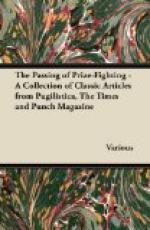The next day, walking through the field, I put up two birds which flew away together. One was Thisbe. And the other? Well, not Strong-i’-th’-lung. I stumbled across him a little later, dead without a wound.
* * * * *
“Wanted Music Master
for 2 girls; also Mincing
Machine.”—Local
Paper.
One way or another they seem determined that the poor girls shall be “put through it.”
* * * * *
SHOULD MILLIONAIRES READ HOMER?
The recent discovery of a London millionaire, who not only lives in a small suburban villa, where his wife dispenses with servants, goes to bed at 7.30 p.m. and rises at 3 a.m., but reads Homer in the Greek, has caused a sensation.
His endeavours to prove to a doubting world the truth of a favourite British adage is admirable; and his modest establishment only bears out what the millionaires keep on telling us, that, owing to high taxation and the abnormal cost of luxuries, they must really be reckoned as poor men. But his study of Homer provokes a difference of opinion.
Our representative, in interviewing a venerable sociologist on the subject, was told that the study of Greek for millionaires is, within proper limits, comparatively harmless, but that Homer contains the elements of danger.
“It is in Homer’s apotheosis of heroism in human combat that the peril lies,” he said. “Having regard to the part played in the past by financiers in the wars between civilised nations, the security of the League of Nations will be threatened if the millionaires of to-day come under the spell of that great poet, who, with all his excellent qualities, directed his genius so persistently to the praise of warfare.”
One of the millionaire class was next approached, and was asked what he thought of millionaires reading Homer.
“Why not?” he asked. “Some millionaires are great readers. I am one myself. There are not half-a-dozen of Oppenheim’s I haven’t read; and I like Hall Caine—and Ethel Dell’s not bad. Who is this Homer? If he’s any good I may as well order him.”
“Well, Homer was a poet, you know, a—”
“I’ve no use for poetry,” said the millionaire.
“A Greek poet, who lived—”
“Greek. A Greek, did you say?” A shrewd look came into his eyes. “Some of the cutest devils I know are Greeks.” He pulled down a shirt-cuff and took a diamond-studded pencil from his waistcoat pocket. “How do you spell it? With an H?”
* * * * *
“POULTRY AND EGGS.
Belfast or Neighbourhood.—Locum
Tenency or Sunday duty wanted
by well-known Rector during
holiday.”—Irish Paper.
It looks as if he had been mistaken for a Lay-reader.
* * * * *
“Nothing is left of
the knave of the church, but the choir still
remains.”—Scotch
Paper.




